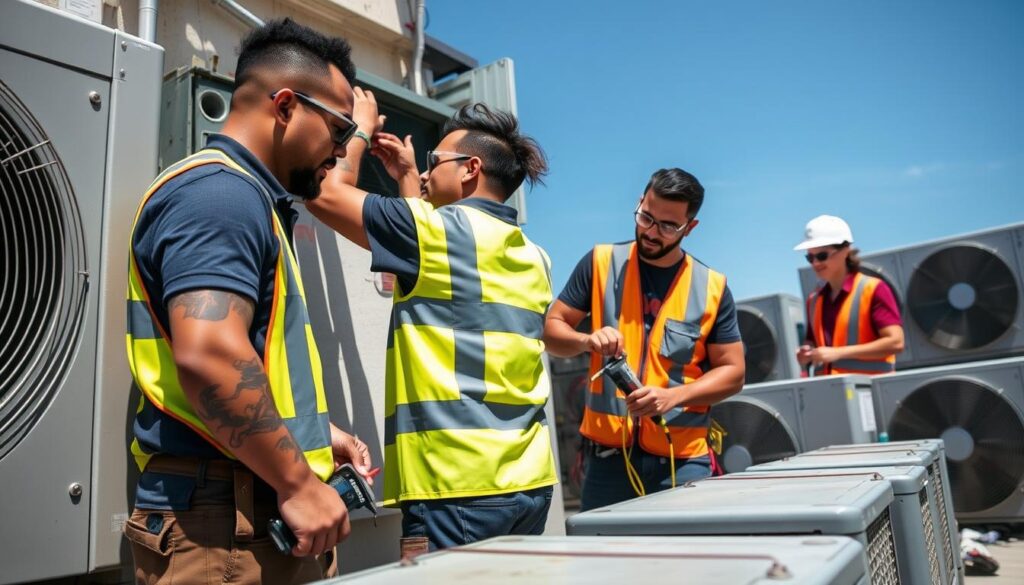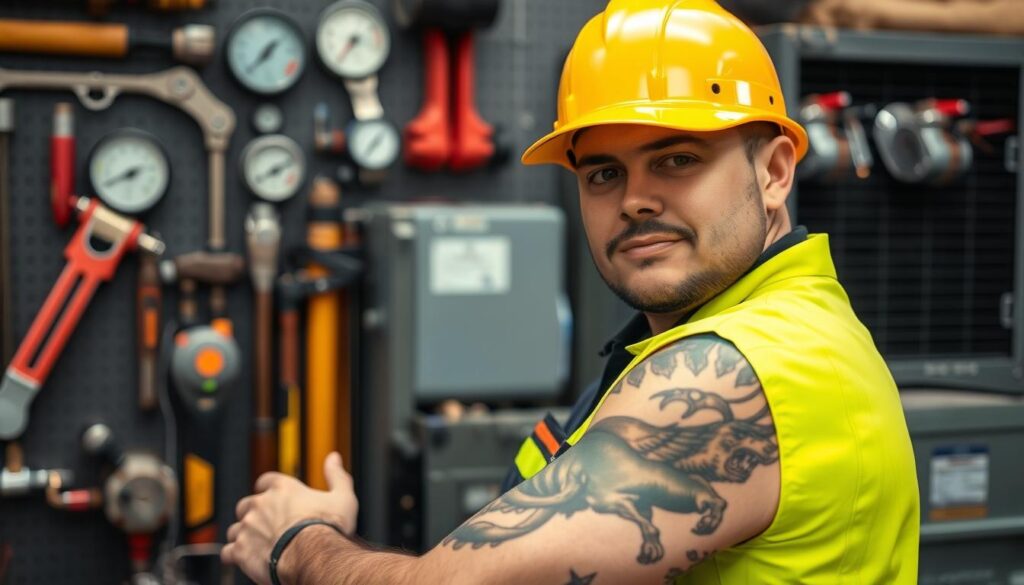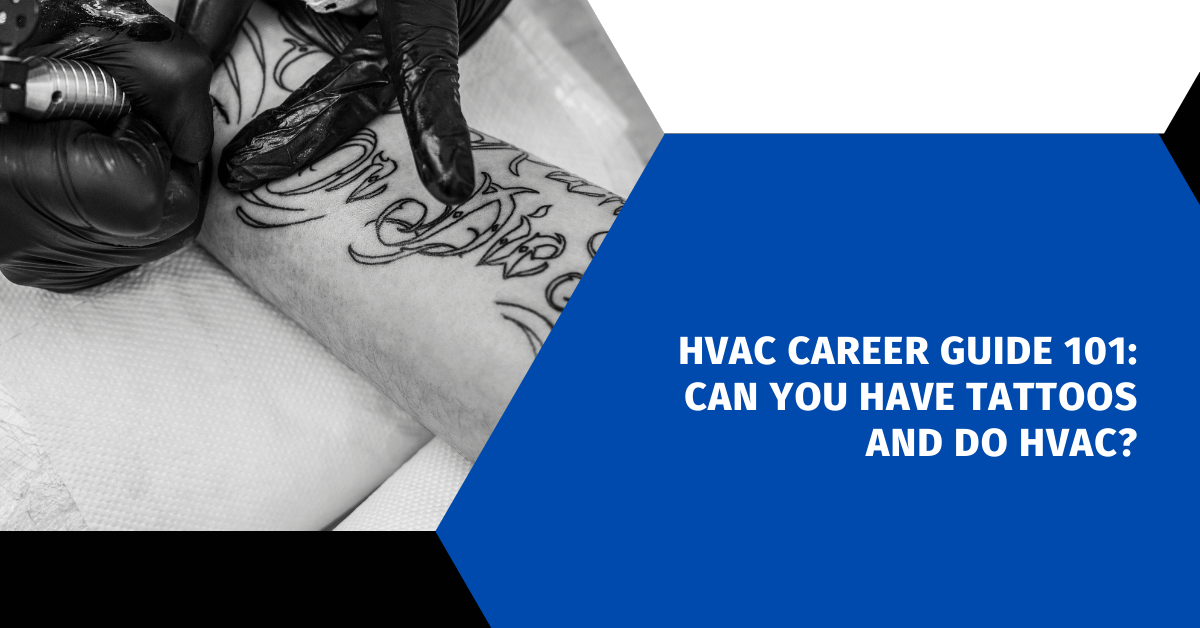Affiliate Disclosure
HVAC Guide Guys is a participant in the Amazon Services LLC Associates Program, an affiliate advertising program designed to provide a means for sites to earn advertising fees by advertising and linking to Amazon.
Can You Have Tattoos and Do HVAC? The HVAC industry is changing, and people wonder if you can have tattoos and still work in it. With more places accepting tattoos, the answer might be yes. Learn how the HVAC world is changing and how people with tattoos are doing well in their jobs.

Key Takeaways
- The acceptance of tattoos among HVAC technicians is on the rise, with many companies revising their policies to allow visible body art.
- HVAC companies have varying approaches to tattoos, from strict policies to exceptions for meaningful ink.
- Clients’ preferences can significantly impact the rapport and trust-building process for HVAC technicians with tattoos.
- Proper tattoo care and understanding workplace safety protocols are essential for HVAC pros with body art.
- Maintaining a balance between individual expression and professional appearance is key for tattooed HVAC technicians.
Table of Contents
The Current State of Tattoos in HVAC Industry
The HVAC workforce now sees tattoos in a new light. Some companies still ban tattoos, but many HVAC firms are changing their rules. They want to welcome a more diverse team.
Evolution of Workplace Acceptance
Recent trends show more people are okay with tattoos. A Harris Poll found 3 in 10 adults in the U.S. have tattoos. This change has made HVAC employers rethink their tattoo policies.
But, how people view tattoos varies by region. In places like the Pacific Northwest, tattoos are common. But in the Deep South, they might still be seen differently. HVAC companies need to understand these differences when making their rules.
Industry Statistics and Trends
Younger HVAC workers are more likely to have tattoos. This change has made many HVAC companies rethink their dress codes. They aim to be both professional and welcoming.
| Statistic | Value |
|---|---|
| Adults with at least one tattoo | 3 in 10 |
| Adults in their 30s with tattoos | Nearly 2 in 5 |
| Adults with tattoos in the U.S. | 1 in 5 |
Appearance matters when meeting customers or employers. But HVAC firms must also value skill. Some focus on looks, while others care more about talent and tattoos.
Explore Our HVAC Shop
Looking for top-rated HVAC tools, parts, and accessories? Visit our shop and find the perfect solution for your needs.
Visit the ShopCan You Have Tattoos and Do HVAC?
In the HVAC industry, tattoos are no longer a big deal. People used to think they were a barrier, but that’s not true. The industry is now more open to how people look, including their tattoos.
Some jobs might ask you to cover your tattoos, but it’s not all about looks. It’s about your skills, knowledge, and how professional you are. Many HVAC techs with tattoos do great, even when their tattoos are hidden.
More HVAC companies are realizing tattoos don’t affect how well you do your job. Studies and stories show the HVAC field is getting more okay with tattoos, especially among the younger workers.
“A successful HVAC company owner, who started in the trade at 16 and now runs a multimillion-dollar company, was recognized for community involvement and ethical business practices despite having extensive tattoos that are usually hidden under clothing.”
But, some places might still have rules about tattoos. It’s smart to check the company’s rules before applying. You might need to talk about your tattoos during an interview.
In short, the HVAC industry is more open to tattoos now. It values your skills and how you treat customers more than your looks. Even with dress codes, the focus is on doing a good job and serving customers well.
Explore Our HVAC Shop
Looking for top-rated HVAC tools, parts, and accessories? Visit our shop and find the perfect solution for your needs.
Visit the ShopUnderstanding Employer Policies and Restrictions
In the HVAC industry, tattoo policies can differ a lot. Some companies have strict rules against visible HVAC dress code. Others are more open to body art. It’s key for HVAC hopefuls to know the tattoo policies and workplace regulations of potential employers before taking a job.
Common Dress Code Requirements
Many HVAC companies ask technicians to hide tattoos. They might wear long-sleeved shirts or use bandages. But, some employers might make exceptions for tattoos that are meaningful or culturally significant, as long as they’re not seen as offensive.
Company-Specific Guidelines
- Some HVAC businesses have a “no visible tattoo” policy, while others are more accepting of body art.
- Employers may consider the size, location, and content of a tattoo when determining if it is acceptable in the workplace.
- Certain companies may have specific dress code requirements, such as requiring technicians to wear long sleeves or cover up tattoos with makeup.
Legal Considerations
The laws about tattoo policies in the workplace can be tricky and change by state. For example, in Texas, employers can legally look at a candidate’s tattoos when deciding to hire. HVAC pros should know the laws in their area to follow all rules.
| State | Tattoo Policy Regulations |
|---|---|
| Texas | Employers can legally consider tattoos when making hiring decisions. |
| California | Employers cannot discriminate against employees based on their tattoos, unless they are deemed offensive or unprofessional. |
| New York | Employers must have a valid business reason to restrict visible tattoos in the workplace. |
By knowing the HVAC dress code rules, tattoo policies, and workplace regulations of potential employers, HVAC pros can make smart career choices. They can also make sure they meet the industry’s expectations.
Impact of Tattoos on Client Relations
As an HVAC pro, how you look and act matters a lot. Tattoos are more accepted in work now, but some clients might still worry about your image. They might see a tattooed technician as less professional.
Studies show many customers, especially older ones, might think less of tattooed HVAC techs. They might see them as less trustworthy. This could hurt your ability to build strong client relationships and get repeat business.
But, many customers care more about your skills and how you treat them than your tattoos. Tattooed HVAC pros often get great feedback and high satisfaction scores. This shows that trust and rapport come from how you act and interact with clients.
| Concern | Impact on Client Perceptions |
|---|---|
| Negative Perception of Tattoos | Customers may view technicians with visible tattoos as less professional or “unsavory,” potentially impacting their trust and willingness to work with them. |
| Impact on Customer Relations | Tattoos could create an uncomfortable atmosphere and negatively influence the customer’s experience, affecting the technician’s ability to build rapport and provide excellent service. |
| Industry Representation | The presence of heavily tattooed professionals in the HVAC industry may be perceived as giving the field a “bad name,” potentially impacting the overall industry’s reputation and image. |
Dealing with client views and professional image can be tough. But, the main thing is to focus on great service, looking polished, and having good customer interactions. This is true, no matter your style or tattoos.

“The way you present yourself can have a significant impact on how clients perceive your professionalism and trustworthiness. As an HVAC technician, it’s essential to find the right balance between self-expression and maintaining a professional image.”
Explore Our HVAC Shop
Looking for top-rated HVAC tools, parts, and accessories? Visit our shop and find the perfect solution for your needs.
Visit the ShopProfessional Success Stories of Tattooed HVAC Technicians
Many tattooed HVAC professionals have achieved great success despite the stigma. Their stories show how talent, hard work, and a positive attitude can overcome body art stereotypes.
Career Advancement Examples
Alex, a fully tattooed HVAC technician, quickly rose from duct sealing to certified service technician in 2.5 years. His hard work and skills won him respect from peers and customers. This proves that body art doesn’t limit one’s career.
Samantha, a tattooed HVAC pro, started a multimillion-dollar company. Her business has flourished, winning industry awards. This shows that passion and entrepreneurial spirit can overcome appearance-based barriers.
Customer Feedback and Experiences
Many tattooed HVAC technicians have received great feedback from customers. People appreciate their professionalism, skills, and friendly nature. This shows that a technician’s abilities and character matter more than their tattoos.
Some customers love the unique touch tattooed technicians bring to their work. This personal approach helps build strong client relationships, leading to higher satisfaction and loyalty.
The success of tattooed HVAC technicians shows that talent, hard work, and a focus on customers are key. Embracing this can lead to fulfilling successful HVAC careers for tattooed professionals.
Best Practices for Tattooed HVAC Professionals
The HVAC industry is changing, and tattoos are becoming more accepted. While some places still have strict rules, many are getting more open. Tattooed HVAC pros can thrive by following a few key steps.
First, know what your boss and clients think about tattoos. Some places want them hidden, while others don’t mind. Talk openly with your employer and be ready to change how you look if needed.
Being professional is key, even with tattoos. Make sure your tattoos are respectful and focus on great service and skills. In HVAC, your work and attitude matter most.
Also, think about how tattoos might affect your work with clients. Even though tattoos are more accepted, some people might still have concerns. Be polite and show your skills to win them over.
Lastly, keep your tattoos safe and clean. Follow good hygiene to avoid problems. Also, remember to cover them up if it’s a safety rule.
“The key measure of professionalism in the HVAC industry is a technician’s expertise and workmanship, regardless of physical appearance.”
By following these tips, tattooed HVAC pros can excel. They can show off their skills and build great careers.
Safety and Practical Considerations
When working in the HVAC industry, safety is always first. Tattooed HVAC technicians must follow strict safety rules. This includes wearing the right personal protective equipment (PPE). Keeping tattoos clean is also key to avoid skin problems that could affect work.
Protective Equipment Requirements
HVAC work can be dangerous, with chemicals, hot surfaces, and moving parts. Tattooed technicians need to wear:
- Insulated gloves to protect hands from burns or abrasions
- Safety glasses or goggles to shield eyes from debris or splashes
- Steel-toed boots to guard feet against heavy objects or falls
- Flame-resistant clothing to prevent injury from fire or sparks
Workplace Safety Protocol
Along with PPE, HVAC pros with tattoos must follow strict safety rules. They should keep tattoos clean, moisturized, and away from sunlight and chemicals. Washing hands well and staying clean is also important for a safe work area.
| Safety Measure | Importance for Tattooed HVAC Technicians |
|---|---|
| Proper PPE usage | Protects skin and tattoos from exposure to hazards |
| Tattoo care and hygiene | Prevents skin irritation, infection, and maintains professionalism |
| Adherence to safety protocols | Ensures a safe working environment for both the technician and clients |
By focusing on safety and tattoo care, HVAC pros with tattoos can look professional. They also keep themselves and clients safe.
Explore Our HVAC Shop
Looking for top-rated HVAC tools, parts, and accessories? Visit our shop and find the perfect solution for your needs.
Visit the ShopManaging Visible Tattoos in Professional Settings
The HVAC industry is slowly accepting tattoos in the workplace. Technicians must balance their personal style with a professional look. Some companies still have rules about visible tattoos, especially for those who meet clients.
Technicians can use tattoo cover-up techniques to hide their tattoos. This might mean wearing long sleeves or using makeup. It helps them look professional while keeping their personal style.
How much tattoos are accepted varies by industry and company. Some HVAC firms see tattoos as a way to express oneself. Others have strict dress codes. Knowing your company’s rules and talking about any issues is key.
It’s all about finding a balance between being yourself and following work rules. By knowing the trends, following company policies, and using cover-up methods, technicians can succeed. They can keep their personal style while meeting work expectations.

“The ability to express oneself through body art should not be at odds with professional success. With open communication and adaptability, HVAC technicians can find ways to honor their individuality while upholding the standards of their industry.”
Conclusion
The HVAC industry in the United States is slowly getting more open to tattooed workers. Even though some old-fashioned views still exist, your skills and how you act are what truly matter. As people’s views change, tattooed HVAC techs can do well by showing their talents, being professional, and following rules.
The outlook for HVAC jobs with tattoos is good, with more places okay with tattoos. Staying up-to-date with industry trends and what employers want is key. By following the best practices, like covering tattoos when needed, you can have a successful career in HVAC.
In short, the HVAC industry’s growing acceptance of tattoos shows a bigger change in society. It’s your skills, knowledge, and professionalism that will define your career. By focusing on your abilities and being professional, you can succeed in HVAC, no matter your tattoos.

